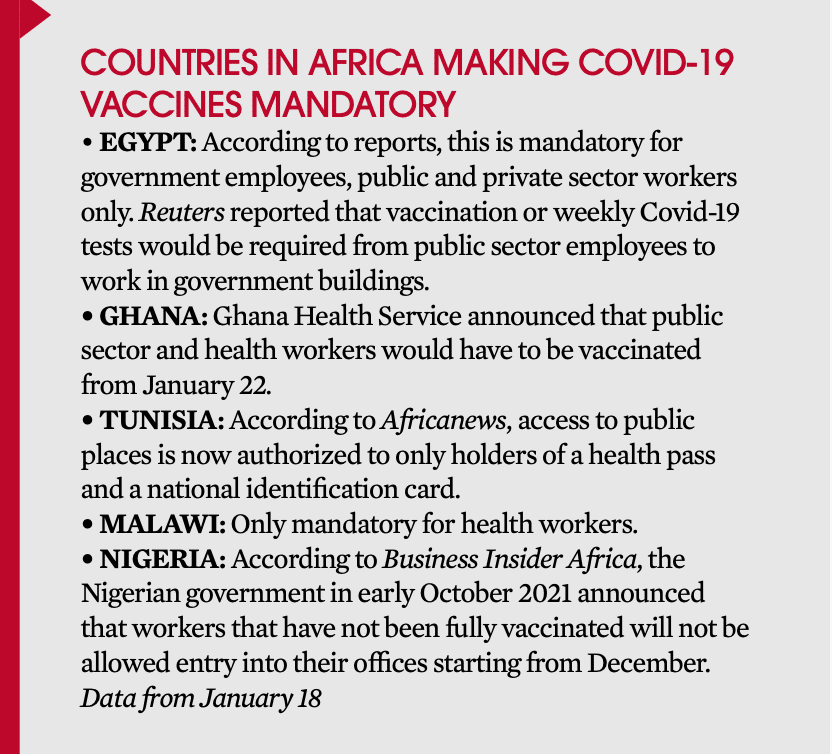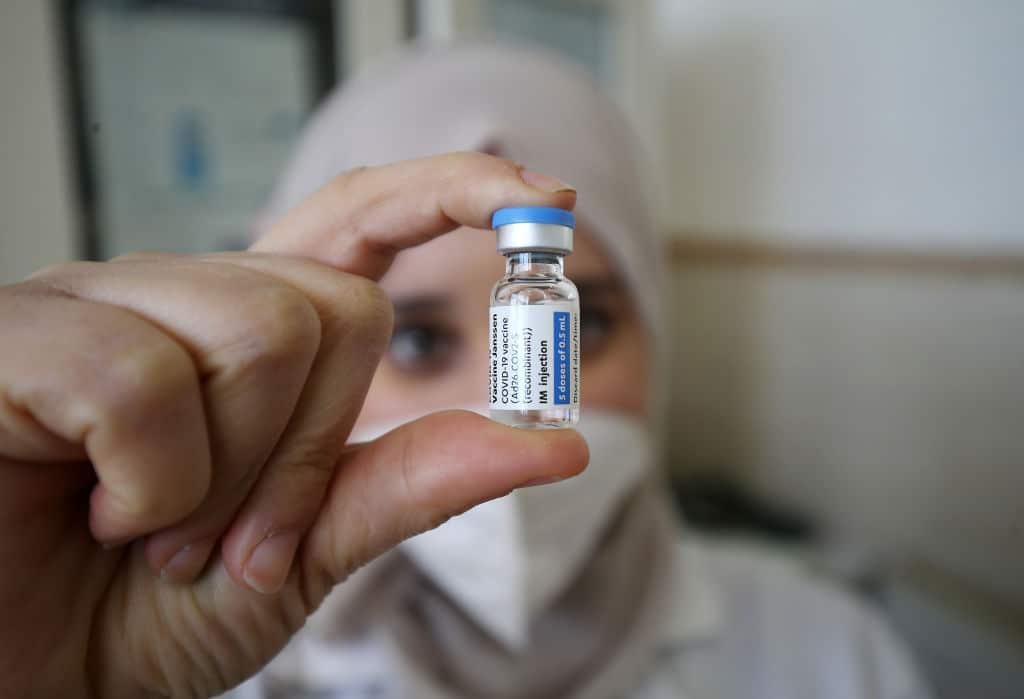AS COVID-19 VARIANTS SURGE across the world, so does the contentious concomitant conversation: should countries and companies make vaccines mandatory? Politicians are faced with both increasing pressure and protests against the impending policy around the world.
South Africa too has had its share of raging debates around this issue. In a nationwide address in November last year, just as Omicron was making a grand appearance, President Cyril Ramaphosa announced that “the government has set up a task team to undertake broad consultations on making vaccination mandatory for specific activities and locations”.
He reiterated this at the 110th anniversary of the African National Congress (ANC) on January 8: “To enable our economy to return to full operation, we urge everyone in South Africa who is not yet vaccinated to ensure they are vaccinated as soon as possible.
“The ANC urges the government to finalize a policy on
the introduction of vaccine mandates for particular settings and activities. Such a policy would be a valuable addition to the instruments we have to contain and manage Covid-19.”
Loading...
The much-disputed issue has been met with disdain in some quarters, although some businesses have already opted to make vaccines mandatory in their policies.
Business for South Africa (B4SA), an alliance of South African volunteers working with the South African government, released Mandatory Vaccination Policies – Guide & Resources For Employers, a report stating that there could be no “return to normal” until a significant proportion of the population is fully vaccinated.
“Vaccines reduce severe illness, hospitalization and death amongst those who do get Covid-19. In our view, if we don’t dramatically improve the vaccination rate, we risk overburdening the health system again and forcing South Africa to consider the harsh lockdown restrictions that harm the economy, jobs and livelihoods. Vaccination can help prevent this,” the B4SA report read.

Anything that would lead to a return to normality in society will obviously help the country’s economic
– Danie Pretorius, employment lawyer and commercial litigator, Fluxmans Attorneys
According to the report, multiple businesses across South Africa have already committed to implementing mandatory vaccination policies, among them Anglo American, Aspen, Dis- Chem, Big Concerts and Discovery to name a few.
Dr Ronald Whelan, head of Discovery’s Covid-19 task team and Chief Commercial Officer at Discovery Health, speaks to FORBES AFRICA about the South African-based financial services group’s decision to mandate vaccines.
The company implemented its Covid-19 vaccination policy on January 1 for its South Africa-based employees. Whelan says their latest data showed that about 97%* of Discovery’s staff members are vaccinated, which is just over 10,000 individuals.
“We’re very proud of how employees have responded to this, they’ve really stepped up to the plate, and taken a bold leadership and role modeling position, not only in corporate South Africa, but also across their communities,” Whelan states.
“Our core purpose is to make people healthier and to enhance and protect their lives.”
Events company Big Concerts has also been amongst the few to model the vaccine mandate strategy and practise it. Although the events industry works largely on an “industry-wide position” blueprint which entails suppliers (security force, cleaning and catering departments etc), it’s as insistent as Discovery that in dealing with an ambiguous, dispersed workforce, health needs to be prioritized.
“As employers and operators of these venues, and now I’m talking things like stadiums, we employ thousands of people,” Justin Van Wyk, the CEO of Big Concerts, tells FORBES AFRICA. “Now, these people are put into an environment, what we call high-risk congregate environments, where they are exposed to other human beings, strangers, and we have an obligation in terms of the law to protect these people and their health and safety and create a safe working environment.”
Van Wyk says that within his workforce, he has seen no pushback towards mandating vaccines.
Whereas, at Discovery, about 2.5% of the workforce are not in favor of vaccinations which then means that a deliberation between the two parties is necessary.
“There are certainly some employees against vaccines. I don’t want to call them anti-vaxxers. I think that’s become a derogatory term to some extent, I think they’re against vaccination for a variety of reasons, most particularly medical concerns, but there are also some employees that have some constitutional rights concerns,” Whelan says.
He states that Discovery will seek to accommodate those employees who may have suitable and justifiable reasons for not being vaccinated. “But for those employees who don’t have reasonable and justifiable
reasons for not wanting to be vaccinated, we’ll certainly try and work with them to understand those reasons,” Whelan explains. “If it is at all possible to convince them to get vaccinated, we will reach a common ground. But unfortunately, in a very unlikely event, if we can’t reach a common goal, they will have to part ways with us.”
“There’s no such thing as forced vaccinations, you can’t force anyone to do something,” Van Wyk adds. “A mandate basically states that this is the policy to enter this workplace or into this public establishment. You don’t have to go and vaccinate yourself… That is your constitutional right, but the consequences of that decision is yours and yours alone.”
The legal implications against a company would not be that dire, Fluxmans Attorneys, a law firm in South Africa, tells us. Danie Pretorius, an experienced commercial litigator and head of the firm’s employment law practice, says: “An employer will not be permitted to forcefully vaccinate its employees, for example holding employees down and administering the vaccine upon them. That would constitute an assault and would also infringe the constitutional right to bodily integrity. However, a refusal to be vaccinated by an employee, where his employer insists on vaccination, could have negative consequences for such an employee.”

One needs to recognize that Covid-19 has been a public health tragedy in South Africa, and indeed, globally… the vaccines have been rolled out to billions of people globally, over 6 billion people today have been vaccinated.
– Dr Ronald Whelan, Chief Commercial Officer, Discovery Health
At the end of May/June last year, South Africa’s Department of Employment and Labour published a revised Covid-19 Direction on Health and Safety in the Workplace which provides guidelines for employers on the issue of mandatory vaccination.
Within the direction, it states that this is intended to guide employers, employers’ organizations, employees, trade unions, conciliators, arbitrators and the court in determining the fairness of a mandatory vaccination policy and its implementation.
Pretorius explains that if an employee refuses the vaccination on constitutional or medical grounds, the employer should investigate the validity and/or reasonableness of the refusal. Once the employer determines whether the refusal is valid and reasonable, the employer is required to take reasonable measures to accommodate the employee in the workplace.
“If reasonable accommodation is unworkable or impractical, the employer can consider dismissal for operational requirements. This
would be particularly the case when it can be shown that vaccination is an inherent requirement for the job. For example, to make it safe for that employee and other employees, and that, without vaccination, the employee cannot render services safely.”
Gerhard Papenfus, CEO at the National Employers Association of South Africa, wrote an open letter to Ramaphosa recently stating the controversial conversation of vaccine mandates has the potential of “tearing our society apart”.
In the letter, Papenfus states that the vaccines have not been proven to provide any benefit to the community they are intended to serve, that ‘vaccinated’ individuals can both contract the virus, and infect others; after a period of months, ‘vaccines’ become counter-productive; it could damage and weaken the immune system and that there are safe and effective medical measures, other than ‘vaccination’, to protect individuals and the community from Covid-19.
“Mr. President, it is inconceivable that you are not aware of these facts,” Papenfus said in the letter. “If you are, why do you not act upon it? If you are not aware of this, why do you not allow for credible doctors and scientists, even internationally, to brief you on this? How is it that you even ignore some of the advice from the Ministerial Advisory Committee on Covid-19, appointed by the Minister of Health?”
Dr Anne Biccard, South African author and emergency doctor, explains that the issue with trying to mandate the Covid-19 vaccine is that South Africa has not mandated any vaccines.
It is advised that parents get their children vaccinated, and theoretically, if they are not, they won’t be able to go to school.
“But in reality, actually, the government doesn’t take a stance on vaccines, even for children, which is longer for Covid-19 vaccines to be mandatory or compulsory,” Biccard says. “There are only a few countries in the world where those are mandatory, I think France and Canada, both of them make children’s vaccines mandatory. So I suppose they would have the platform from which to now make adult vaccination mandatory.
“I think in South Africa, we would struggle to make it mandatory because nothing is mandatory yet. So to make this mandatory is going to be a real stretch and obviously there is going to be a legal implication because people, some anti-vaxxers, are saying it’s against their rights to freedom.”
Countries around the world, like Austria, the Czech Republic, Ecuador and Germany, have mandated vaccines for either specific occupations or all adults. France now has a vaccine pass and has made it legally necessary to be vaccinated to access events and eateries.
At the end of 2021, similar actions were underway on the African continent too, with countries such as Nigeria and Kenya considering or implementing mandates.
However, in Kenya, according to reports, a judge suspended a government directive pending a case hearing that was filed by a businessman who termed it a gross violation of the Constitution.
“Information from all over the world, including the Centre for Disease Control (CDC) in the United States of America, indicates that ‘vaccinated’ people are more susceptible to Omicron than ‘unvaccinated’ people,” Papenfus added in his letter.
Biccard notes that although it is difficult to mandate vaccines,
it’s also difficult to know what the long-term effects could be of the vaccine.
“We can’t say what the long-term sequelae of the vaccine are but I think a lot of anti-vaxxers are very clear on what the dangers are. But I’m not sure how they got to be clear on that information because I’m not even clear on it,” Biccard adds.
“But I would encourage everyone to get vaccinated because it’s the only defence we have.”
And it is probably the only defence, for now, to set the country’s economy on the path of recovery.
“Anything that would lead to a return to normality in society will obviously help the country’s economic recovery process,” Pretorius adds. “The only weapon against the pandemic to date that has had any effect on the spread and consequences of the virus has been the advent of vaccines. Should more people become vaccinated, [it] would provide the only currently available possibility of a return to normality in society.”
“One needs to recognize that Covid-19 has been a public health tragedy in South Africa, and indeed, globally,” Whelan adds. “So, the vaccines have been rolled out to billions of people globally, over 6 billion people today have been vaccinated.
“And the results are excellent, both from a safety perspective, as well as from an efficacy perspective. So I think it’s incumbent on us against the backdrop of a public health tragedy to use the tools that are available and proven to be safe and effective to mitigate any risk of further disease and death.”

FORBES AFRICA reached out to South Africa’s Presidency for comments on vaccine mandates, however, didn’t receive any until the time of going to press.
Loading...
